My journey to the ground zero of the conflict between Russia and Ukraine began in Moscow.
The terminal stop of the train I took from Moscow to reach the Rostov-on-Don, a city closer to the Ukrainian border, is the Adler Train Station near the Black Sea coast. The train is full of domestic tourists on their way for holiday. Fully packed with travelers, the train is finally moving. It is an old but sturdy train, reminiscent of the Soviet era.
We leave Moscow behind. Endless steppes and plains start to come in front of our view.
A border crossing?
The passengers know all the procedures and processes of the train, as if they had spent their entire lives on this train.
Tea is served to passengers. The family I share the same couchette with offers me the food they brought from home. Their energetic children, aged around 9 or 10, have the letter “Z”, which became a symbol of war, shaved on their hair. Eventually our conversation with the family gets to the topic of war and the predictions of a post-war Russia. Although my travel company complain about price increases after the economic sanctions imposed by the West, they say that their country is fighting a justified war, which will result in a victory. When they learn that I was from Turkey, they tell me about the holidays they spent over at the Turkish Riviera.
After a 23-hour train ride, we arrive at Rostov-on-Don. I meet with the group of experts and press members, at the hotel that was pre-notified to us. The hotel lobby is full of uniformed Russian soldiers that will accompany us on our trip, some of them wearing T-shirts with the letter “Z” on them. Our group will cross the border late at night. Waiting for the departure, I take myself to the streets of the city. The streets of Rostov-on-Don are lively. Music can be heard from cafes and bars. Yet we are only a few kilometers, around 40 minutes of drive, away from the war zone.
The departure time is coming. Before boarding the bus, the soldiers notify that this is not a touristic trip and that safety rules to be told must be strictly followed.
The nightfall comes. Our bus takes curvy paths towards the border, accompanied by armored vehicles. We arrive at the border crossing, which is not physically present and has practically lost its meaning. But we still go through a border checkpoint. We are now entering the territory that was once part of Ukraine after dissolution of the Soviet Union and is now part of the Donetsk People’s Republic. My watch shows that the time is 5 a.m.
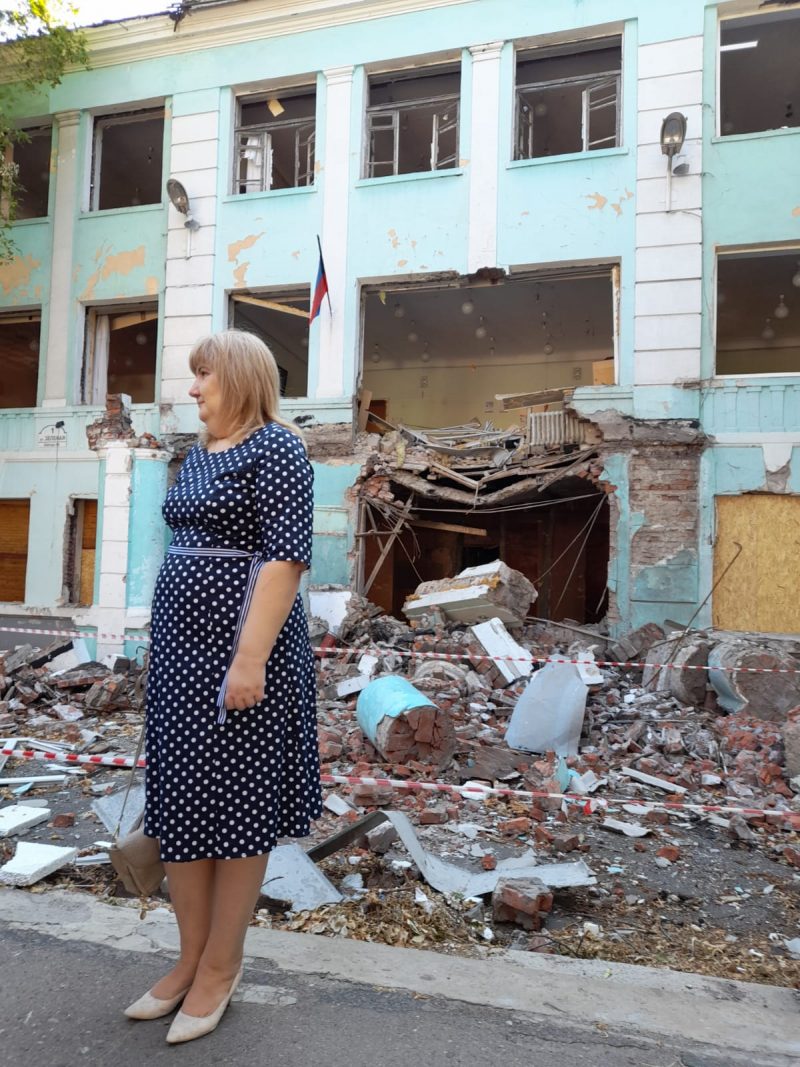
“A fight between good and evil”
Early in the morning, our first stop is a hospital that is under construction. A heavy security perimeter is established. When I ask where the construction workers are from, they are told that the majority of them come from nearby towns.
During the hospital visit, we have a chat with a Russian official working in the region. He clearly states that mistakes were made at the beginning of the war, but then a change of tactics was eventually made. A “swift attack” sounds good from the outside, but it was not the appropriate tactic when we look at the results, he says. Then he adds, “the war has found its rhythm”.
Leonid Pasechnik, leader of the Lugansk People’s Republic, which was established with the support of Russia, is heading towards the press members to make a statement. He is wearing a military uniform and has his wife beside him.
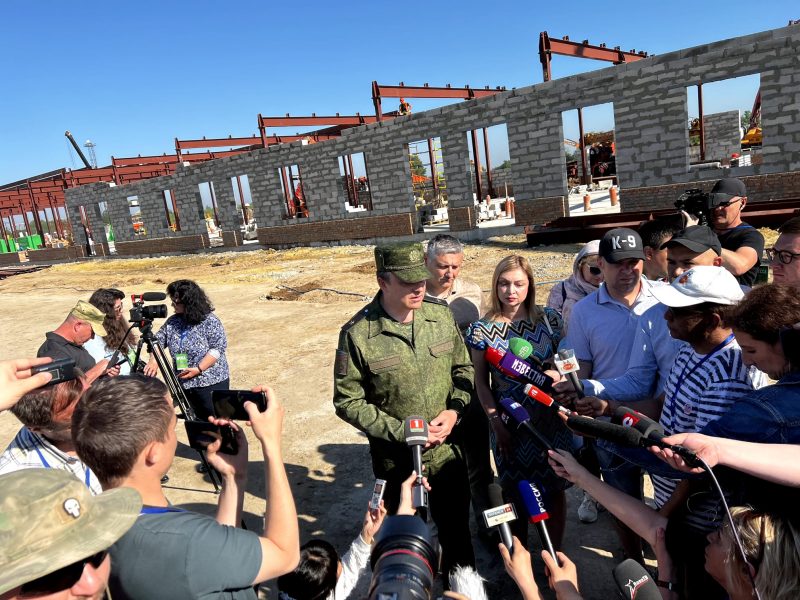
The most striking part of his speech is: “This is an ideological war. We are fighting against the Nazism. The fight between good and evil continues…” He criticizes Western support for the Ukrainian forces. Interestingly, all military personnel and politicians who speak for informational purposes, were all using a very low tone throughout their speeches.
Our second stop is a Ukrainian checkpoint that the Russian army has captured in March. A short presentation on weapons delivered by the West is made, and some examples are visually shown. It was told that the bunkers prepared by the Ukrainians before the Russian intervention began, have slowed down the Russian advance significantly. I ask a soldier serving in the region when the war could end, and he confidently answers “victory is inevitable.” But the Russian army has still not been able to maintain a full control of the region.
The message of “life still goes on”
The next stop is the Alchevsk Metallurgical Complex. Together with Azovstal, this is one of the largest steelwork plants in Europe, dating back to the 1890s. Azovstal has been witnnessed intense conflicts. This plant, on the other hand, has interestingly fallen into the hands of the Russian side with little to no resistance. It is managed by a partnership of state and private enterprises. A detailed briefing was given at the plant, with the name of the manager of the complex, the total number of employees (21.000), and even the average salary of the workers (800 USD).
During our 5-day visit, we are briefed to visit 3 different factory complexes and cultivational areas of various scales and types.
It is obvious that with these visits, the Russian Defense Ministry, which organized this entire program, aims to show that production, trade and agriculture, and in short, overall life continues in the regions captured by the Russian forces.
In the evening we leave for Donetsk, where we will spend the rest of the night. The streets in the city center of Donetsk are empty. Only a few people can be seen passing by with shopping bags in their hands. A significant portion of the buildings were damaged in the clashes.
The war began here back in 2014, long before the Russian military operation. Despite the rich coal reserves and a heavy industry infrastructure in the region, a significant part of the population has emigrated due to the war.
On the street with the entrance of our hotel, it is written “OSCE (Organization for Security and Co-operation in Europe), your blindness causes the death of others” in large letters. As a result of the hacking of information from the cameras of OSCE officials in the region by the Ukrainian computer hackers, it is shared that there are heavy losses in Donbass. Therefore, a stiff distrust towards the international organizations and against the Westerners is prominent in the city.
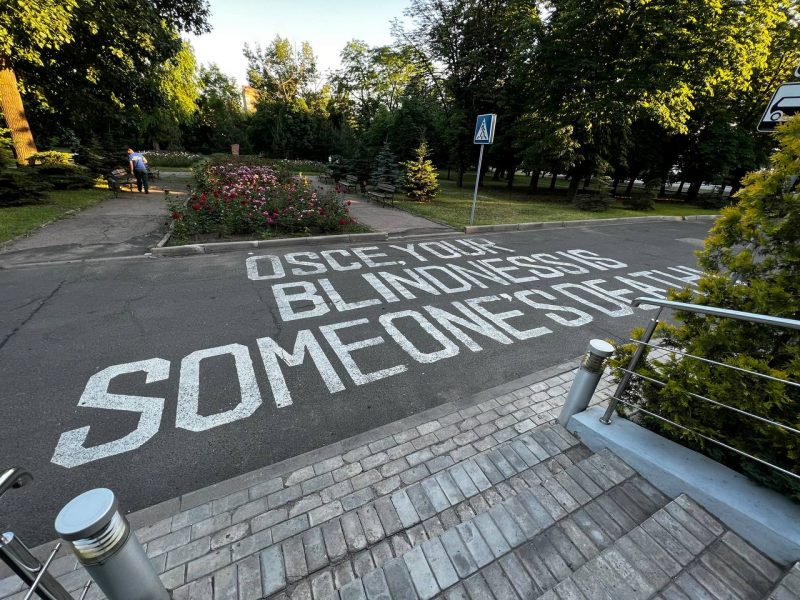
Sleeper cells and a short stroll around the city
In the evening me and a Russian official take a short walk around the city. Artillery fire continues over the city. The Russian forces retaliate, and the artillery fire sounds slowly mingle into questions and answers of conversations.
I wonder if there are still some pro-Ukrainian people in the city. I hear the answer that almost all of the current inhabitants are pro-Russian, but “some Ukrainian sleeper cells that were active in the early days of the special operation may still be present in the city”.
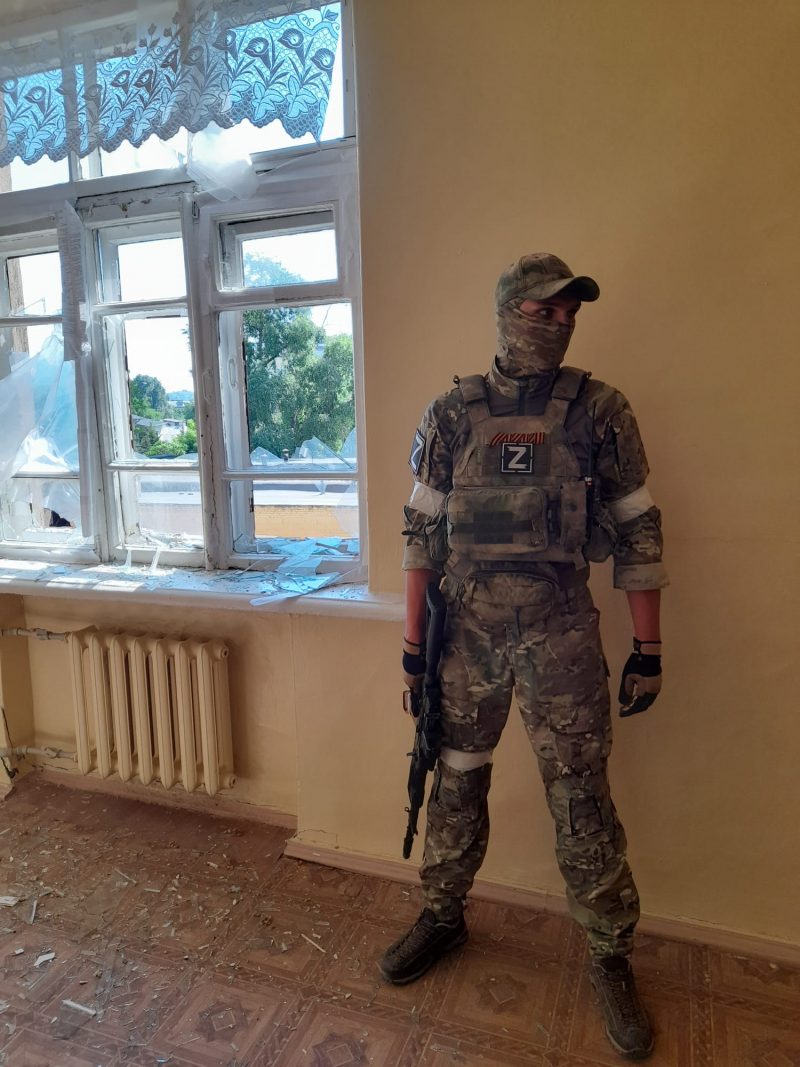
The conversation evolves to Turkey’s possible operation in northern Syria. “We are carrying out a similar operation here, as Turkey’s operations against the PKK in northern Syria (…) The real force we are fighting is the West… NATO did not accept our conditions, and this is the point we have gotten into right now.” He adds: “There is a Russian proverb, he who comes to us with the sword dies by the sword”.
Moonlight shines over the river that divides the city in two parts, and the shelling has still not stopped.








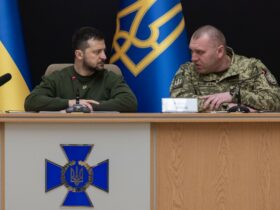








Leave a Reply